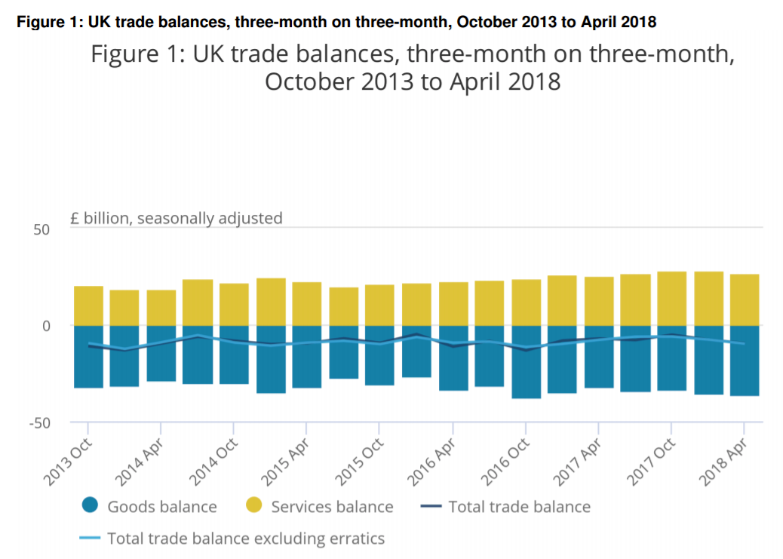UK Trade Deficit Widens in April as UK-EU Goods Balance Deteriorates
-Goods trade deficit widens sharply in April, services surplus shrinks.
-Exports fall faster than imports, marking poor month for UK trade.
-Deteriorating UK-EU goods trade balance the source of decline.

© Winterbilder, Adobe Stock
The UK trade defict widened during the three months to the end of April as exports from the United Kingdom fell faster than imports, with the UK-EU goods trade balance at the centre of the deterioration.
Britain's total trade in goods and services deficit rose to -£5.3bn in the month of April, from -£3.2 billion in March, pushing the total deficit to -£9.7 billion for the three months to the end of April.
The deficit was most marked with countries in the European Union whilst the UK actually narrowed the trade gap with countries outside of the EU.

Above: ONS Graph showing UK trade in goods and services balances.
"The UK’s trade in goods deficit improved £0.6 billion with countries outside of the EU and worsened £1.2 billion with countries inside the EU in the three months to April 2018," the ONS says.
When the UK' services surplus is removed from the numbers, leaving just the nation's trade in goods, the deficit for April was -£14 billion and a total -£36.2 billion for the three months to the end of April. Economists had looked for a much narrower deficit of £-11.35bn.
The Pound fell steeply following the release, from 1.3425 against the Dollar, to 1.3350. The Pound-to-Euro rate fell from 1.1375 to 1.1325.
The wider deficit was mainly put down to a fall in trade volumes of key exports, including machinery, pharmaceuticals, and aircraft. It is notable that industrial production data from the Eurozone's core economies, Germany and France, were also weaker than expected in April and so may explain the decline in UK exports to the bloc.
The trade data looked at over a 12-month period, however, was not so bad. Indeed, the annual numbers actually showed an improvement in the deficit due to an increase in services exports over the period.
"The volume of goods exports, excluding oil and erratics, was 3.0% lower in the three months to April," says Samuel Tombs, chief UK economist at Pantheon Macroeconomics. "As a result, net trade is on course to drag in GDP growth again in Q2, ensuring that its performance since sterling’s depreciation in 2016 remains worse than after all other devaluations since 1945."
The trade data was not the only disappointing release for the UK economy on Monday morning as, at the same time, manufacturing and industrial output were also shown declining during the April month.
Industrial production fell -0.8% in April, down from the 0.1% gain seen in March, when economists had looked for a 0.1% rise. Manufacturing production declined by -1.4%, deepening the -0.1% fall seen in March, which was well below economist forecasts for a 0.3% rebound.
Advertisement
Get up to 5% more foreign exchange by using a specialist provider to get closer to the real market rate and avoid the gaping spreads charged by your bank when providing currency. Learn more here



